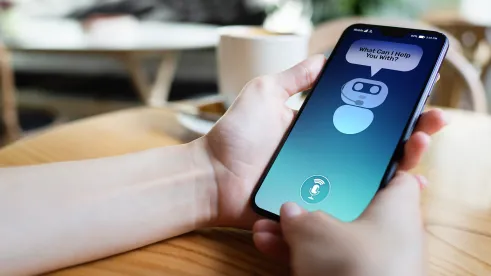Commission Declares TCPA Prohibits AI-Generated Voices
Following up on January’s update, the Federal Communications Commission (FCC) issued a Declaratory Ruling that confirms that the prohibitions in the Telephone Consumer Protection Act (TCPA) covering prerecorded or artificial voice calls apply to real voices generated by artificial intelligence (AI).
The Declaratory Ruling states that “the TCPA’s restrictions on the use of ‘artificial or prerecorded voice’ encompass current AI technologies that generate human voices, such as “voice cloning.” In particular, the Declaratory Ruling makes clear that, as with other prerecorded or artificial voice calls, callers generally must (1) obtain either prior express consent or prior express written consent from the called party (absent an emergency purpose or exemption) prior to making AI-generated voice calls; (2) comply with the FCC’s rules requiring that calls made using prerecorded or artificial voices contain certain identification information and disclosures about the party responsible for initiating the calls; and (3) provide the ability to opt-out of call consistent with the FCC’s revocation of consent rules.
Notably, the Declaratory Ruling takes a broad approach to the use of AI, stating that the Declaratory Ruling and TCPA rules apply to “any AI technology that initiates any outbound telephone call using an artificial or prerecorded voice to consumers.” As noted above, this includes “voice cloning” and other similar technologies that allow callers to (i) “wholly simulate an artificial voice” or (ii) create a voice that “resemble[s] the voice of a real person taken from an audio clip to make it appear as though that person is speaking on the call to interact with consumers.” In addition, the Declaratory Ruling confirms the FCC’s previous holding in its SoundboardRuling that the TCPA applies to any call that uses artificial or prerecorded voice, even calls made with a live agent on the call selecting the prerecorded messages to play.
The guidance in the Declaratory Ruling was effective as of the date of adoption, February 2, 2024, and thus applies currently to all applicable telephone calls.
Commission Adopts Rules to Strengthen Texting Consent Revocation Rights
In last month’s newsletter, we reported on a draft Report and Order and Further Notice of Proposed Rulemaking(“Further Notice”) that the FCC planned to consider at its February Open Meeting. The FCC adopted that item with some important changes. Noteworthy are the following additions the FCC made to the adopted Report and Order:
- The FCC added that when there is a dispute regarding whether some revocation of consent was reasonable, the factfinder (either FCC or a court) must consider a “totality of the circumstances.” Further, the FCC clarified that “[w]here a texter sends a consumer message in a language other than English at the consumer’s request and the consumer attempts revocation in that language using its equivalent of reasonable words evidencing revocation, the factfinder may conclude that the revocation attempt is reasonable under a totality of the circumstances analysis.”
- The FCC also added that in a dispute over revocation, where a consumer has revoked consent using voicemail or e-mail, the consumer must first identify to the factfinder the specific method/message used to convey the revocation to avail themselves of the rebuttable presumption that revocation using that method was reasonable.
- The FCC clarified, with regard to callers’ ability to send revocation confirmation messages, that if compliance with some other specific legal standard would cause the confirmation to be sent later than within five minutes (which is otherwise deemed acceptable), the delay would be presumed reasonable.
- The FCC explicitly declined to specify or “carve out” subcategories of informational text messages that should require individual revocations. Thus, the FCC clarified that when a consumer revokes consent for informational messages, that revocation includes all informational messages, and the caller must cease all informational texts.
In addition to adopting the Report and Order, the Commission also adopted the accompanying Further Notice. The Further Notice, as we reported, proposes to find that the TCPA applies to robocalls and robotexts from wireless providers that call or text their own subscribers. However, in the adopted version of the Further Notice, the FCC no longer proposes to find that the TCPA applies to wireless providers’ calls and texts to their subscribers, but instead seeks “additional comment on whether” the TCPA applies to those calls and texts. While subtle, this is an important change because it signals that the FCC no longer presumes that the TCPA applies to calls and texts from wireless providers to their subscribers and instead seeks to continue building a record on this question.
Comments and reply comments on the Further Notice will be due 30 and 60 days following its publication in the Federal Register.
Commission Removes 13 Entities from Robocall Mitigation Database, Requires Downstream Blocking
On February 22, the FCC’s Enforcement Bureau (“Bureau”) released two Removal Orders, taking action against thirteen voice service providers to which it had issued Show Cause Orders in October 2023. The Orders remove the Robocall Mitigation Database (RMD) certifications of the entities listed below. Based on this action, all intermediate and voice service providers may no longer accept traffic directly from those entities. Failure to cease accepting traffic may subject downstream providers to investigations and FCC enforcement actions.
The first Removal Order was issued against the following companies:
- Viettel Business Solutions Company
- Etihad Etisalat (Mobily)
- Claude ICT Poland Sp. z o. o. dba TeleCube.PL
- Nervill LTD, Textodog Inc. dba Textodog and Textodog Software Inc.
- Phone GS
- Computer Integrated Solutions dba CIS IT & Engineering, Datacom Specialists
- DomainerSuite, Inc.
- Evernex SMC PVT LTD
- Humbolt Voip
- My Taxi Ride Inc.
Four of the companies are domestic voice service providers (Computer Integrated Solutions dba CIS IT & Engineering, Datacom Specialists, DomainerSuite, Inc., and Humbolt Voip), while the other eight are foreign service providers that use US numbering resources in the caller ID field. The Bureau found that all companies failed to submit any corrections to their facially deficient RMD certifications or provide any response required by the Enforcement Bureau’s October 16, 2023 Orders. In addition to downstream providers blocking their traffic, none of the companies will be permitted to refile in the RMD unless and until they are granted permission by the Wireline Competition and Enforcement Bureaus.
The second Removal Order was issued against TELECLUB fka 2054235 Alberta Ltd (TELECLUB). TELECLUB is a foreign service provider that uses US numbering resources in the caller ID field. The Removal Order found that while TELECLUB did timely amend its RMD filings in response to the Bureau’s October 16, 2023 Order, it failed to correct all of the identified deficiencies, and it failed to notify the Bureau of the amendments or explain why it should not be removed. As with the other companies, TELECLUB will not be permitted to refile in the RMD unless and until it is granted permission by the Wireline Competition and Enforcement Bureaus.
Any voice service or intermediate provider currently accepting traffic from any of these companies should stop doing so immediately.





 />i
/>i

